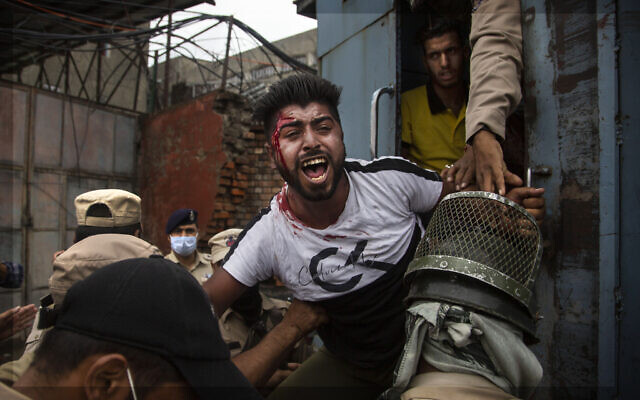SRINAGAR (AFP) — Prime Minister Narendra Modi is changing Indian Kashmir’s residency laws for the first time since 1947, in a bid to snuff out any challenge to the disputed territory belonging to India.
Drawing comparisons with Israel’s “settler” tactics, Modi’s Hindu nationalist government aims to change the demographic makeup and identity of the Muslim-majority region, critics say.
AFP looks at the background, what the new rules are and their implications for the area’s 14 million population.
What has Modi done in Kashmir so far?
The Himalayan former princely state has been split between India and Pakistan since independence from Britain in 1947.
In the Indian-administered part a conflict between separatist rebels and government forces has killed tens of thousands since 1989, mostly civilians.

Indian Prime Minister Narendra Modi, center, waves as he leaves after giving speech to the nation from the ramparts of the historic Red Fort monument on Independence Day in New Delhi, India, Aug. 15, 2020 (AP Photo/Manish Swarup)
More than 65 percent of the population is Muslim. In the Kashmir Valley, the main center of the rebellion, it is close to 100 percent.
On August 5, 2019 Modi’s government revoked articles in the Indian constitution that guaranteed Kashmir’s partial autonomy and other rights including its own flag and constitution.
A huge accompanying security operation saw tens of thousands of extra troops — adding to 500,000 already there — enforce a siege-like curfew. Thousands were arrested and telecommunications were cut for months.
Jammu & Kashmir state was demoted to a union territory governed directly from New Delhi, while the Ladakh region was carved out into a separate administrative area.
Creating such new “facts on the ground” in Kashmir has long been advocated by the Rashtriya Swayamsevak Sangh, the hardline Hindu parent organisation to Modi’s BJP party.

Indian policemen detain a Kashmiri Shiite Muslim as he attempt with others to take out a religious procession in Srinagar, Indian controlled Kashmir, Aug. 28, 2020 (AP Photo/Mukhtar Khan)
The move sent a further shudder through India’s 200-million Muslim minority and defenders of its secular traditions, who fear Modi wants to create a Hindu nation — something he denies.
“What I see unfolding is a Hindu settler colonial project in the making,” Mona Bhan, associate professor of anthropology at Syracuse University who has long researched Kashmir, told AFP.
What happened to Kashmir’s special rules?
Modi’s government tore up Kashmir’s special residence rules dating back to 1927 which had ensured only permanent residents could own land and property, secure government jobs and university places and vote in local elections.
Now a raft of different categories of people from anywhere in India can apply for domicile certificates, giving them access to all the above.
These include those living in Kashmir for 15 years, who include around 28,000 refugees who fled Pakistan and as many as 1.75 million migrant laborer — most of whom are Hindus.

A Kashmiri farmer woman carries rice saplings for replanting in a paddy field on the outskirts of Srinagar, Indian controlled Kashmir, June 9, 2020 (AP Photo/Mukhtar Khan)Parvaiz BUKHARI
In addition, civil servants who have worked in Kashmir for seven years and their children, or students who have taken certain exams, also qualify for domicile status.
The changes are “the most drastic imposed since 1947,” Siddiq Wahid, a historian and political analyst, told AFP. “It was done with the intent to open the gates to demographic flooding.”
What do locals have to do?
Locals too now have to apply for the new “domicile certificates” in order to qualify for permanent resident rights.
To get this, they have to produce their Permanent Resident Certificates (PRC), cherished documents valid since 1927, which then become worthless.
Speaking to AFP on condition of anonymity, an engineering graduate said young Kashmiris were in effect being forced to give their political loyalty to India in exchange for a livelihood.
“They say, you want a job, OK, get the domicile document first,” he said.
Is anybody happy?
A few people. Bahadur Lal Prajapati, born in Indian Kashmir to Hindu refugees who fled Pakistan during its first war with India over Kashmir seven decades ago, is finally an official resident and has “never been so happy.”
“We got the right to live in this part of India as citizens after 72 years of struggle,” Prajapati, 55, told AFP from his home in Jammu, the Hindu-dominated district of the region.

An Indian paramilitary soldier stands guard by a closed road, as Kashmiris marked Eid during lockdown to curb the spread of coronavirus in in Srinagar, Indian controlled Kashmir, Aug. 1, 2020 (AP Photo/Mukhtar Khan)
One of the first people to receive the new domicile certificate was Navin Kumar Choudhary, a top bureaucrat from the Indian state of Bihar who worked in Kashmir for many years.
Photos on social media of Choudhary proudly holding the certificate sparked huge anger among Kashmiris but delight among Modi’s supporters.
What happens if people complain?
Some 430,000 new domicile certificates have been issued — despite the coronavirus pandemic. It is unclear how many of them are to people from outside and how many to locals.
Many locals are refusing to swap their old documents, even though this makes life harder. Some do it in secret for fear of censure from their neighbors.
Wary of being labelled “anti-national” by the authorities many Kashmiris are also scared to speak out openly. Some are deleting their Twitter accounts.
“It’s a travesty that I have to compete with outsiders for citizenship rights in my own homeland,” said a student — who also wished also to remain anonymous out of fear of problems with the authorities.
Related posts:
Views: 0
 RSS Feed
RSS Feed

















 August 29th, 2020
August 29th, 2020  Awake Goy
Awake Goy  Posted in
Posted in  Tags:
Tags: 





















